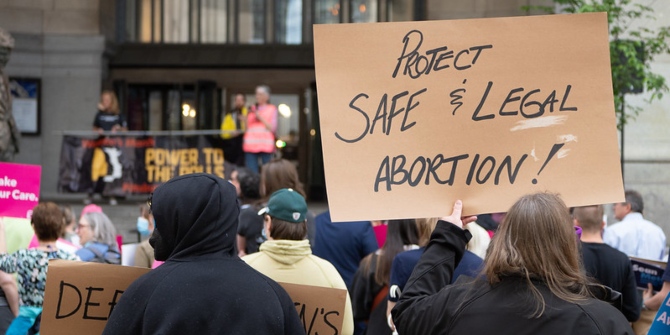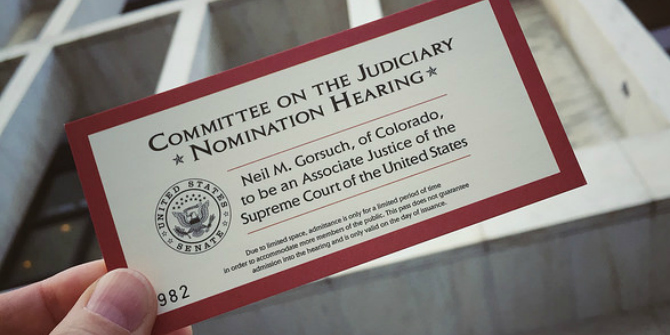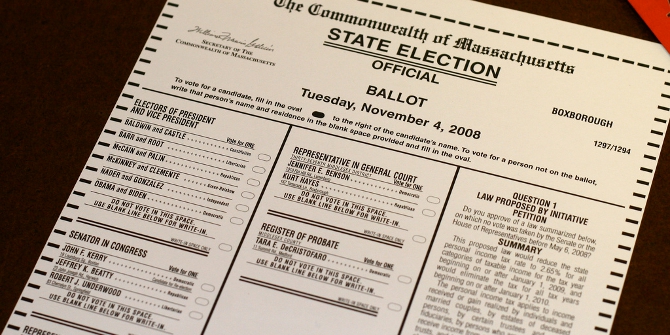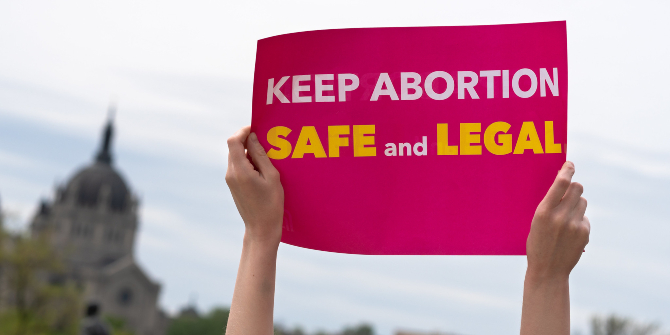 This week, a leaked draft decision from the US Supreme Court in the Dobbs v. Jackson case indicated that the Court may be on the verge of overturning the 1973 Roe v. Wade decision which gave women the right to a safe and legal abortion in the US. Alex Garlick writes that the move, which is the result of a decades-long effort from anti-abortion rights groups, will have an immense human cost as states with “trigger bans” begin to prohibit abortions, and that there will be political implications at the state and national level as well.
This week, a leaked draft decision from the US Supreme Court in the Dobbs v. Jackson case indicated that the Court may be on the verge of overturning the 1973 Roe v. Wade decision which gave women the right to a safe and legal abortion in the US. Alex Garlick writes that the move, which is the result of a decades-long effort from anti-abortion rights groups, will have an immense human cost as states with “trigger bans” begin to prohibit abortions, and that there will be political implications at the state and national level as well.
When Politico published a leaked draft decision yesterday by United States Supreme Court Justice Samuel Alito in the Dobbs v. Jackson case, it signaled that the court is primed to overturn Roe v. Wade (the 1973 decision which gave women constitutional protection to have safe and legal abortions). Without the courts providing the right to an abortion, at least a dozen states have a “trigger ban” waiting to go into effect that will prohibit abortions. This will have immediate human costs on reproductive health care, as it will lengthen wait times for Americans to access abortions. In addition to these immense policy effects, the collapse of Roe will also have major political implications, particularly in the states as both Republican and Democratic elected officials will engage in this heavily contested policy area.
The decision to overturn Roe is the result of a decades-long effort from anti-abortion rights groups. In 2019, I wrote about how anti-abortion rights groups were pushing for the passage of abortion restrictions that were destined to be struck down in the federal courts because they sensed a “window of opportunity” was primed to open after Justice Brett Kavanaugh was added to the Supreme Court by President Donald Trump. This window only expanded when Justice Amy Coney Barrett was confirmed in 2020, meaning the radical anti-abortion wing of the court no longer had to rely on the more moderate Chief Justice John Roberts to form a majority to strike down Roe. When Alito’s draft opinion was released, John Stemberger, the president of the Florida Family Policy Council said: “this is the moment that we have been working for our entire lives. This would not be the end of the pro-life movement but simply the beginning.”
As a policy area, abortion presents opportunities for ambitious members of both parties to build their profile. My 2017 article in American Politics Research showed that abortion had the most nationalized interest group community, where the groups lobbying at the state level also lobbied in Congress. These groups often have maximalist policy demands, so legislators looking to secure their endorsements or financial support will need to continue to push to restrict abortion. It is no surprise that Republican legislators and candidates in Florida, Georgia and elsewhere are now calling for special sessions to further restrict abortion in light of the SCOTUS ruling.

“220503_RoeVWade_Rally_Pittsburgh-1001184” (CC BY 2.0) by TheNoxid
The decision will also have implications for Democratic politicians. There is also a well-funded network of abortion rights groups closely aligned with the Democratic party. Without Roe as a backstop, these advocates will push to strengthen state-level abortion protections. This can provide an opportunity for Democratic state legislators or candidates to champion this cause. In 2013, Texas State Senator Wendy Davis received national attention for filibustering abortion legislation in pink sneakers, which she used to fuel a gubernatorial run. California’s Democratic governor Gavin Newsom has already floated the concept of enshrining the state’s abortion protections with an amendment to the state’s constitution.
With the political incentives for Republicans to restrict abortion access and Democrats to expand access, it’s a sure bet that the policy landscape in the states will continue to polarize. It is also going to raise the stakes in Congress. The top Democrats in Congress, Speaker of the House Nancy Pelosi and Senate Majority Leader Chuck Schumer issued a joint statement criticizing the Supreme Court and pledging to codify abortion rights; however, the effort appears doomed from the start for Democrats, considering Joe Manchin’s record of voting to restrict abortion rights. Not that it would matter, as the Supreme Court would surely strike down a Congressional bill to protect abortion rights. Things may be likely to move in the opposite direction, as reporters are already speculating that the next time Republicans have control of the White House, Senate and House of Representatives, they would be likely to move to restrict abortion nationwide.
There is a chance that overturning Roe could incite a public-opinion backlash. According to Pew, 59 percent of Americans say abortion should be legal in all or most cases. However, that support is not evenly distributed across the country, and support for abortion may be far lower in Republican-controlled states. Rolling back abortion rights may galvanize that support. However, re-enshrining abortion rights would likely require substantial procedural reforms, including changes to the Senate’s filibuster rules, or perhaps expansion of the Supreme Court itself. While these outcomes are not likely, it’s hard to imagine what the fallout from such a consequential action could motivate. The only certainty of the Supreme Court’s anticipated decision in Dobbs v. Jackson is that it will vastly increase the stakes of abortion policymaking at the state-level.
Please read our comments policy before commenting.
Note: This article gives the views of the author, and not the position of USAPP – American Politics and Policy, nor the London School of Economics.
Shortened URL for this post: https://bit.ly/3yarCdy
About the author
 Alex Garlick – The College of New Jersey
Alex Garlick – The College of New Jersey
Alex Garlick is an assistant professor in the Department of Political Science at The College of New Jersey. His research focuses on legislative institutions, particularly lobbying before Congress and the state legislatures.






